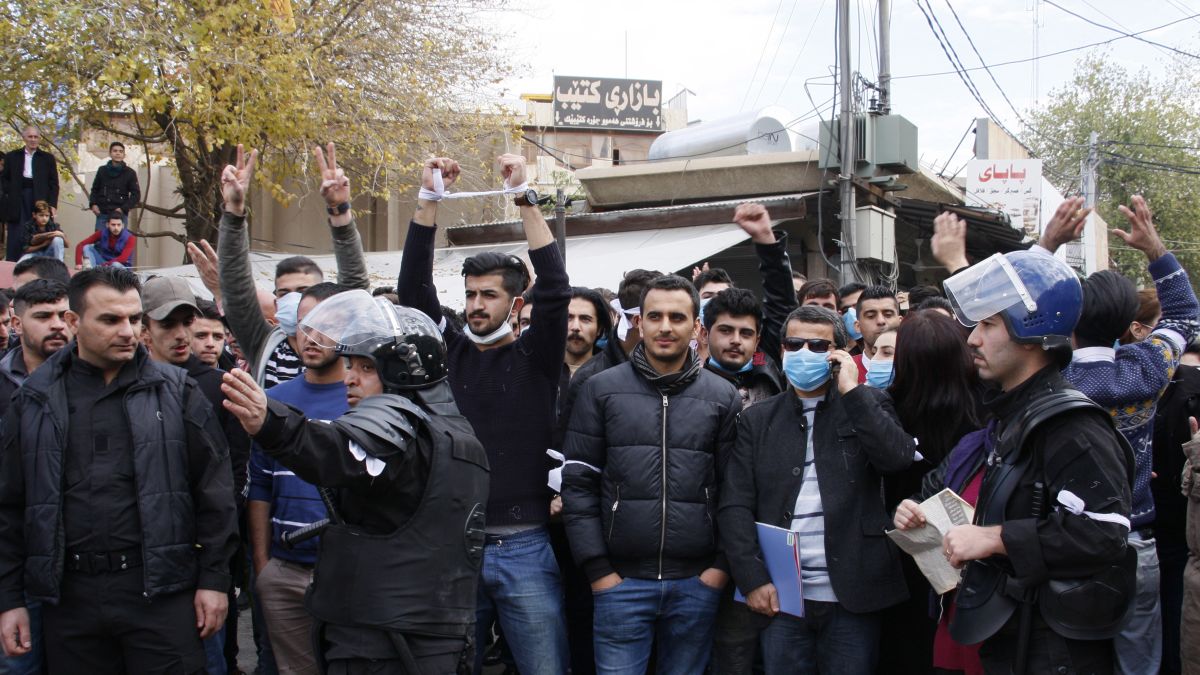Ahlulbayt News Agency: The massive street protests in Suleimaniya north of Iraq that started nearly two weeks ago against the four-month workers pay delays, rife corruption, and grave economic conditions still continue in the Kurdish province.
Reports said that in this round of protests, the demonstrators in addition to chanting against the political leaders and politicians of the autonomous Kurdish region seized offices of the political parties and torched them in a show of anger with the situation of administration in the Kurdish region.
Iraqi media reported that headquarters of the region’s key parties, Kurdistan Democratic Party (KDP) and Patriotic Union of Kurdistan (PUK) in Tekya neighborhood, the education department, and the traffic police headquarters in Sharzour east of Suleimaniya were set on fire, too.
Further reports said that the KDP, PUK, and the Kurdistan Islamic Movement’s offices in Khurmal were also burned by the furious protestors. The headquarters of the border guard forces and city council in Khurmal suffered the same fate.
But the insistence on continuation of the demonstrations, which risks spread of the protests to other provinces of the region like the capital Erbil and Duhok comes while High Security Committee of Kurdistan on Thursday published a statement banning any unauthorized rallies and warning that it would take actions to prevent them.
As the security forces moved to disperse the protestors, clashes erupted between the two sides, Iraqi media reported. So far, nine were killed and over 20 were injured, sources familiar with the development said. The crackdown and violence, in turn, aroused the ire of the people who took to the streets only to ask for salary payment and living conditions improvement.
Hyper economic crisis a result of corruption and inefficiency
The Kurdish region has been grappling with a big economic crisis for years. Slump of the oil prices and consequently decreased income which is the main source providing the government with spending power, along with the halt of budget share delivery to the Kurdistan Regional Government (KRG) by the central government following disputes between Baghdad and Erbil have paved the way for a sheer economic crisis.
According to estimations by the KRG, the monthly expenses of the region are $755 million while the government gains $450 million monthly from its oil sales. One reason for this challenge is the uncalculated hiring of state workers and creating an enormous range of employees under various job titles. The KRG currently has 1,270,000 employees who account for one-fourth of the total population of the Kurdish region.
On the other hand, rampant executive corruption along with the mismanagement, and even lack of management, of the regional leaders to boost the region’s economic infrastructures over the past two decades have made unpaid salaries of public servants a chronic crisis for Erbil. On top of this stands a huge foreign debt said to be around $27 billion.
Demonstrations over unpaid salaries have occurred in the Kurdish region since 2007 periodically. In May and August, the authorities, in a move signaling their resolution to crash the protests, arrested 200 people among them 100 employees and 8 journalists in Duhok. They called the peaceful protestors, many of whom were teachers, “vandals.” Similar protests had taken place in winter of 2017, with the demonstrators calling for salary payment and life improvement.
The KRG is far from affording to address the financial demands of the protests, even though it cut them by 21 percent in a series of austerity measures.
The financial crisis is even worse now as the government in Baghdad imposed limitations on transfer of budget cash to Erbil. Baghdad asks Erbil to hand it the revenues of its oil exports before any steps to deliver annual budget to the Kurds. Another demand by Baghdad tells the KRG it needs to prove that the payments go to real, not “ghost”, workers.
Now the years-long economic crisis immerses the citizens in the autonomous region in pessimism and distrust in the ruling system and elite. They call the KDP and PUK two “family parties” of Barzanis and Talabanis.
Critics say that the two families manipulate the regions sources “like their private assets”, accusing them of corruption and being the main factors behind the gloomy economic and social conditions of the people there. Reports claim that party affiliates asked people for shares between 30 to 50 percent as precondition for permit for their new businesses.
To cover up the widespread corruption, inefficiency, and also to resist genuine reforms, Erbil makes allegations against the central government in Baghdad, as it like before labels the protestors rioters and the rallies a foreign conspiracy, a trick largely threadbare and demoded.
/129

